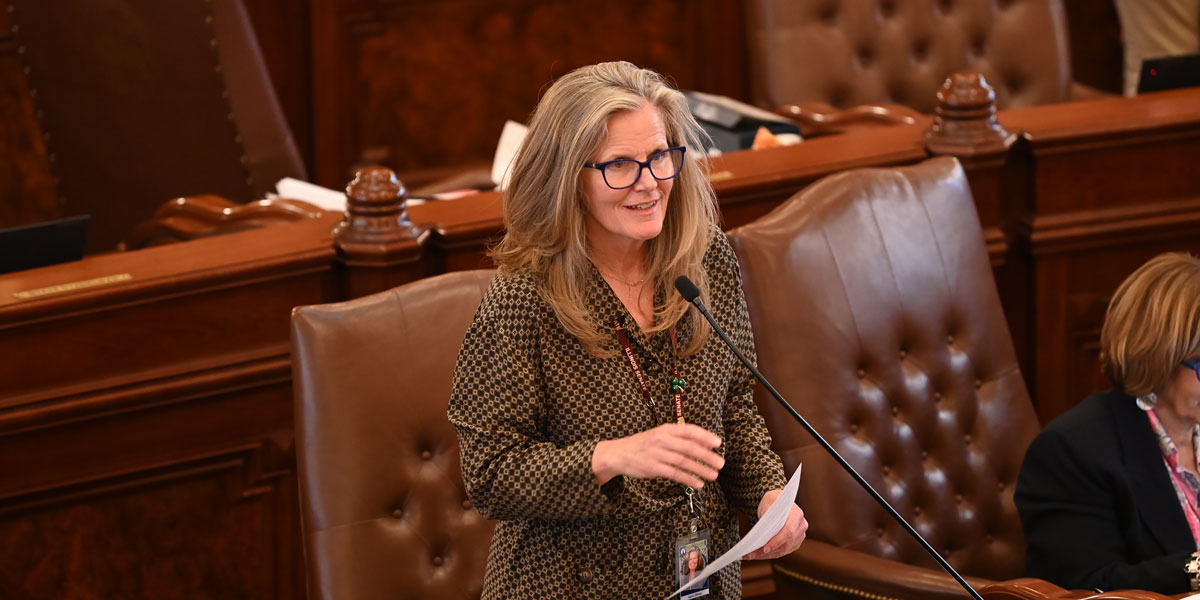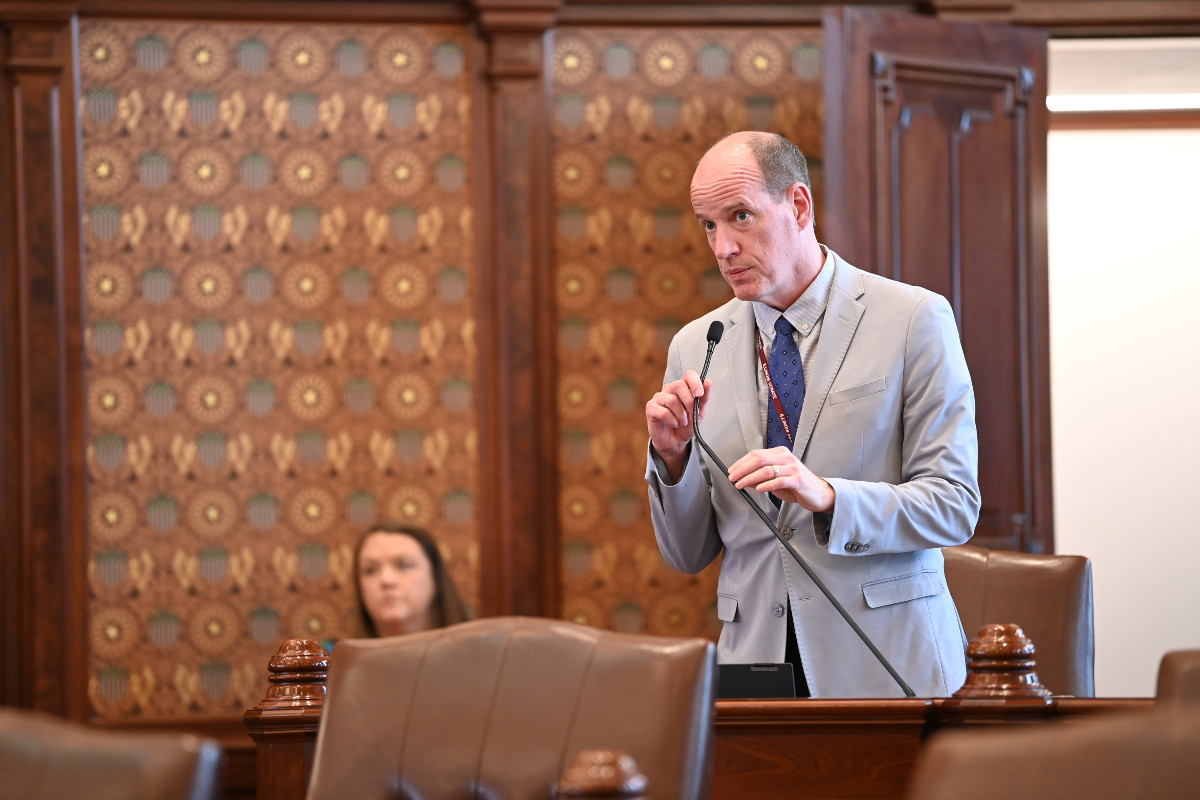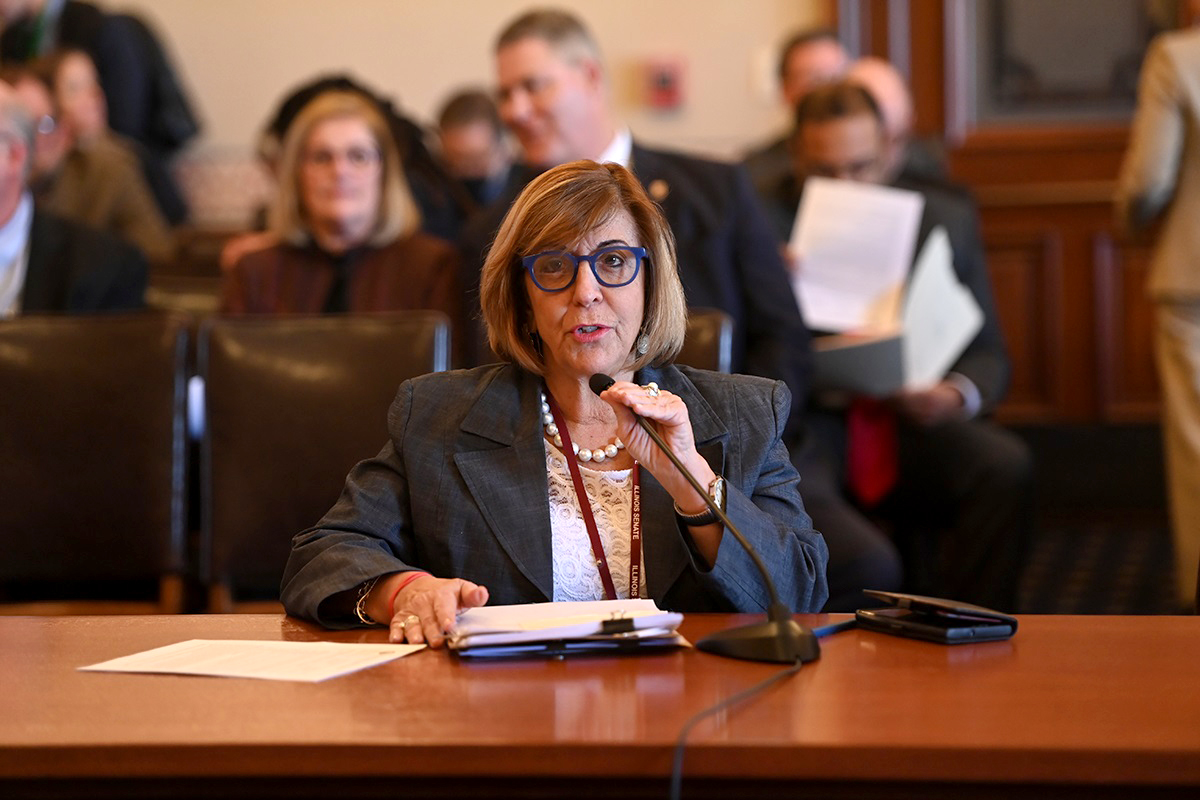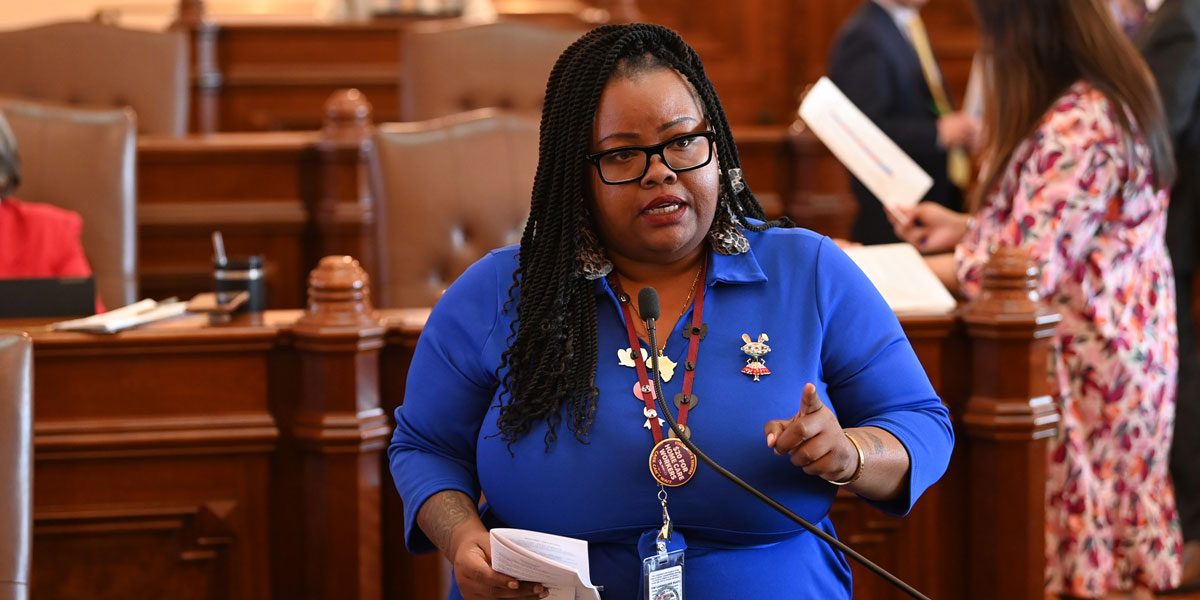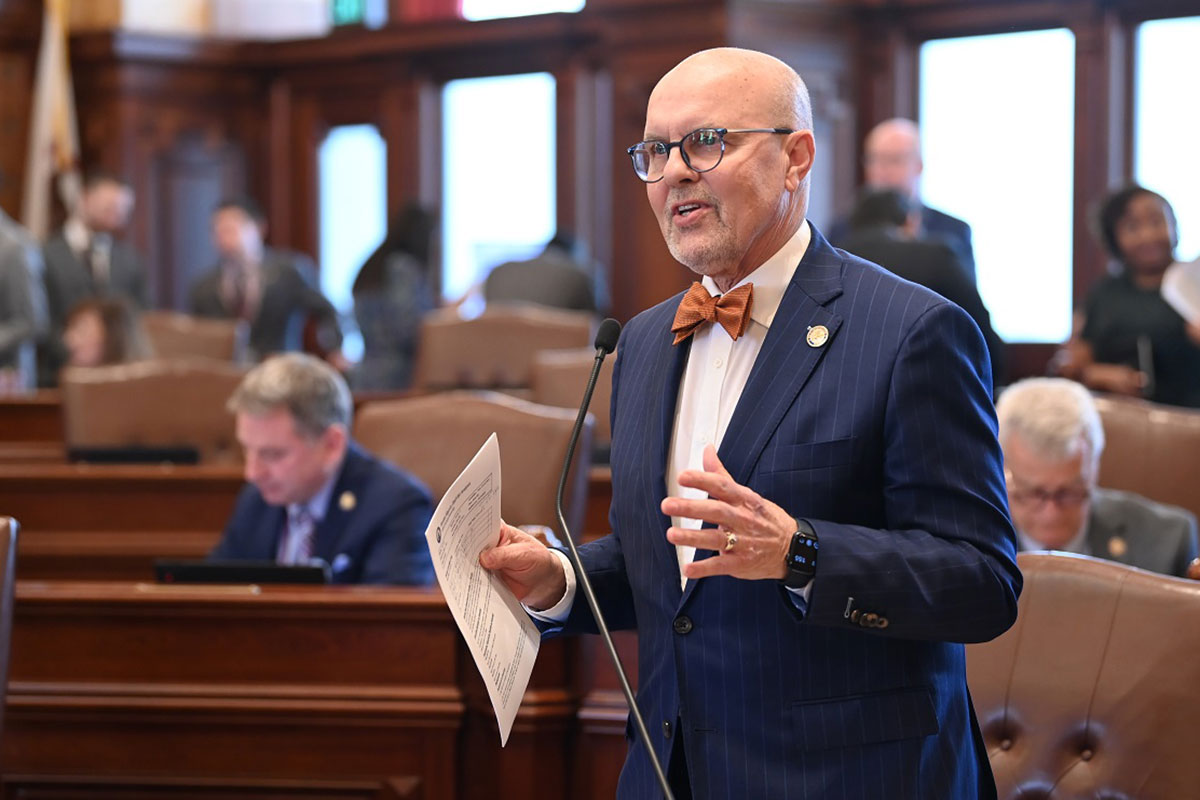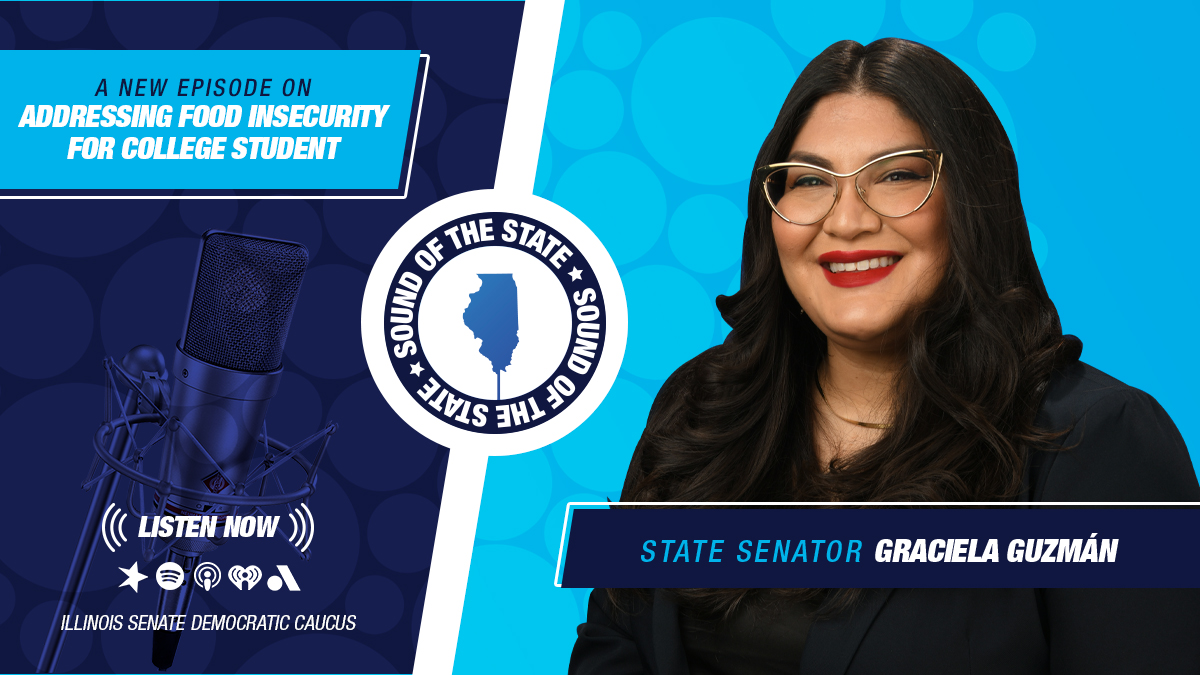- Details
- Category: District Events
Last month's Senior Town Hall and listening session with State Representative Camille Lilly has been rescheduled.
The event will now be held on Thursday, August 28 at 12:30 PM at Lorraine Hansberry Apartments, 5760 W. Lake St., Chicago.
This event is free and open to the public. Light lunch will be served. For more information, contact my office at (708) 848-2002 or Representative Lilly’s office at (773) 473-7300.
I hope to see you there!

- Details
- Category: News
President Harmon was the keynote speaker for the 13th Edgar Fellows class on August 6.
His remarks as prepared are below:
Good afternoon, all.
Thank you for the invitation.
I’m Don Harmon, president of the Illinois Senate.
I’ve had this title for just over 5 years, which somehow makes me the longest serving legislative leader.
Before this, perhaps you had heard of my 16-year endeavor to finally enact state gun dealer registration.
Or maybe the decade I put into getting the Fair Tax on the ballot, which didn’t exactly go the way I’d hoped back in 2020.
Those things are all well and good, but the line in my bio that tends to get the most attention is that I also happen to play guitar in a bipartisan lawmaker band called the Boat Drink Caucus.
We were allegedly a BIG deal back in 2015 because somehow we’d been booked to open for Buddy Guy and Toby Keith in front of more than 2,000 Republicans at governor-elect Bruce Rauner’s inaugural ball.
My Republican bandmates felt right at home.
I’m a Democrat from Oak Park.
I was a stranger in a strange land.
Two highlights from that show.
One – using Toby Keith’s sound system.
We’d never sounded better.
Two – the irony of performing the Rolling Stones’ “You can’t always get what you want” at Bruce Rauner’s inaugural ball.
So at this point you might be wondering:
Why is the Senate President talking about his band?
I’ll tell you why.
All I needed to know to be a legislative leader …
I learned playing in a rock and roll band.
Think about it.
Everyone needs to know their parts, play the same song and at the same tempo, or it all falls apart.
And at least 90 percent of the work is done behind the scenes.
I’m a former House Dem legal staffer, so I really do know, respect and appreciate the work that goes into the legislative process.
As I’ve thought about this, I can point to 3 areas where playing in bands helped in the role I have now.
The first would be Confidence.
It’s not easy to put oneself on public display.
I am still haunted by a high school New Year’s Eve party my band played nearly 40 years ago.
Nobody wanted to hear us.
But just because the crowd doesn’t like one song doesn’t mean you stop playing it.
You have to believe that they’ll love the next one.
And that’s why you keep playing.
A few years later, when I was in law school, I confidently walked into my local lawmaker’s office and told him he should put me in charge of re-chartering the local Young Democrats.
My lawmaker was Phil Rock, who, at the time, was President of the Illinois Senate.
He looked at me over his glasses,
“Alright kid, I’ll give you a shot.”
And years later, when Senate President Emil Jones announced his retirement in 2008, I was among the approximately 30 Democrats vying to be next Senate President.
Obviously I didn’t win.
But it showed I was serious about my role in the Senate and our caucus.
It translated into a leadership post and increased opportunities to work with my colleagues to build consensus on difficult issues.
That helped build their confidence in my abilities.
And here I am.
Second on my list would be Perspective.
It’s an important check on confidence.
At no point have I ever thought that I, or any of our bands, were destined for the Rock N Roll Hall of Fame.
That left me with no choice but to attend law school and devote myself to public service.
Being in the General Assembly also quickly gives one perspective.
I joined the Illinois Senate in 2003.
One of my first committee assignments was the Senate Judiciary Committee.
At the first meeting of each new session, Chairman John Cullerton would go around the room.
Senators introduce themselves and say where they went to law school.
There were a couple DePauls, couple Chicago-Kents, a Loyola, probably a U of I, and so on.
My law degree from the University of Chicago received a slight “oohing” from the audience.
It is a great school.
I’m fortunate to have been admitted.
Anyway, John Cullerton, never one to miss an opportunity to add perspective to a situation, quickly noted that there was one Senator absent.
His name was Barack Obama.
And, Cullerton noted that Senator Obama had a law degree from a little school called … Harvard.
Welcome to the General Assembly.
What I want you to take away is that I ran for the Senate and for Senate President, not to be a star, but rather because I thought I could help people get things done and solve problems.
And along the way, I’ve learned that when you work with others and make your work about others, you get the best results.
It’s important to keep that perspective.
And finally there’s Teamwork, where confidence and perspective combine … or collide.
In 2014, our band was booked to be the opening act for the Phases of the Moon Festival over by Danville.
That was a 4-day, four-stage festival featuring more than 40 bands. We were the very first to play.
The night before, there’s a torrential storm that nearly washes out the festival.
We finally get on stage, and we’re about three songs into our set when the promoter comes running over yelling at us --
STOP!!!.
Turns out the entire festival had been pushed back a couple hours.
The gates hadn’t opened yet.
And THAT’S why we were playing to an empty field, which we hadn’t really noticed because we’re used to very… small … crowds.
As we waited, our bass player tells us he’s quite ill and can’t play.
Seeing no other nominations, I offered to play bass.
How hard could it be?
It’s a guitar with fewer strings.
We do our set, and according to one bandmate, I was:
(quote) surprisingly not that bad. (end quote)
Yay, teamwork!
So, let’s fast forward to 2020.
After Cullerton announces his retirement from office, Kimberly Lightford and I compete to be the next Senate President.
I win the support of the caucus and our session is off and running.
Within days, COVID hits and everything shuts down.
I brought the Senate back to approve an emergency budget and get out of town.
By and large, we felt good about what we’d been able to do in the midst of a pandemic, and how we’d done it.
Then we learned of George Floyd’s murder.
And it was clear that a lot of things needed to change.
As much as I wanted to be part of all of this, it was clear that I was not the right person to lead this effort.
That leader was Kimberly Lightford.
I offered my support, and told her the Senate President’s staff and resources were at her disposal.
Leader Lightford and the Legislative Black Caucus would go on to host a series of important community hearings to shape what became known as the Black Caucus Pillars, which are a legislative blueprint for confronting systemic racism.
Anyone who’s spent any time around the General Assembly recognizes that the legislative process is set up for incremental change.
The lasting success of the Black Caucus Pillars is that they fundamentally changed the conversation about social justice.
The lesson is that leaders don’t need to be in the spotlight.
You never know what role you might play to help the team reach its goals.
Anyway, I hope you’ve enjoyed these stories and take something useful away from them.
In my 5 years as Senate President, I’ve come to recognize that the key to success is the ability to disappoint people at a rate they can digest.
That mostly a joke.
Mostly.
In closing, I’ll bring it full circle and leave you with the leadership advice I offered Bruce Rauner when introducing a certain Rolling Stones song back at his inauguration.
You can't always get what you want
But if you try sometimes you just might find
You get what you need
Thank you.
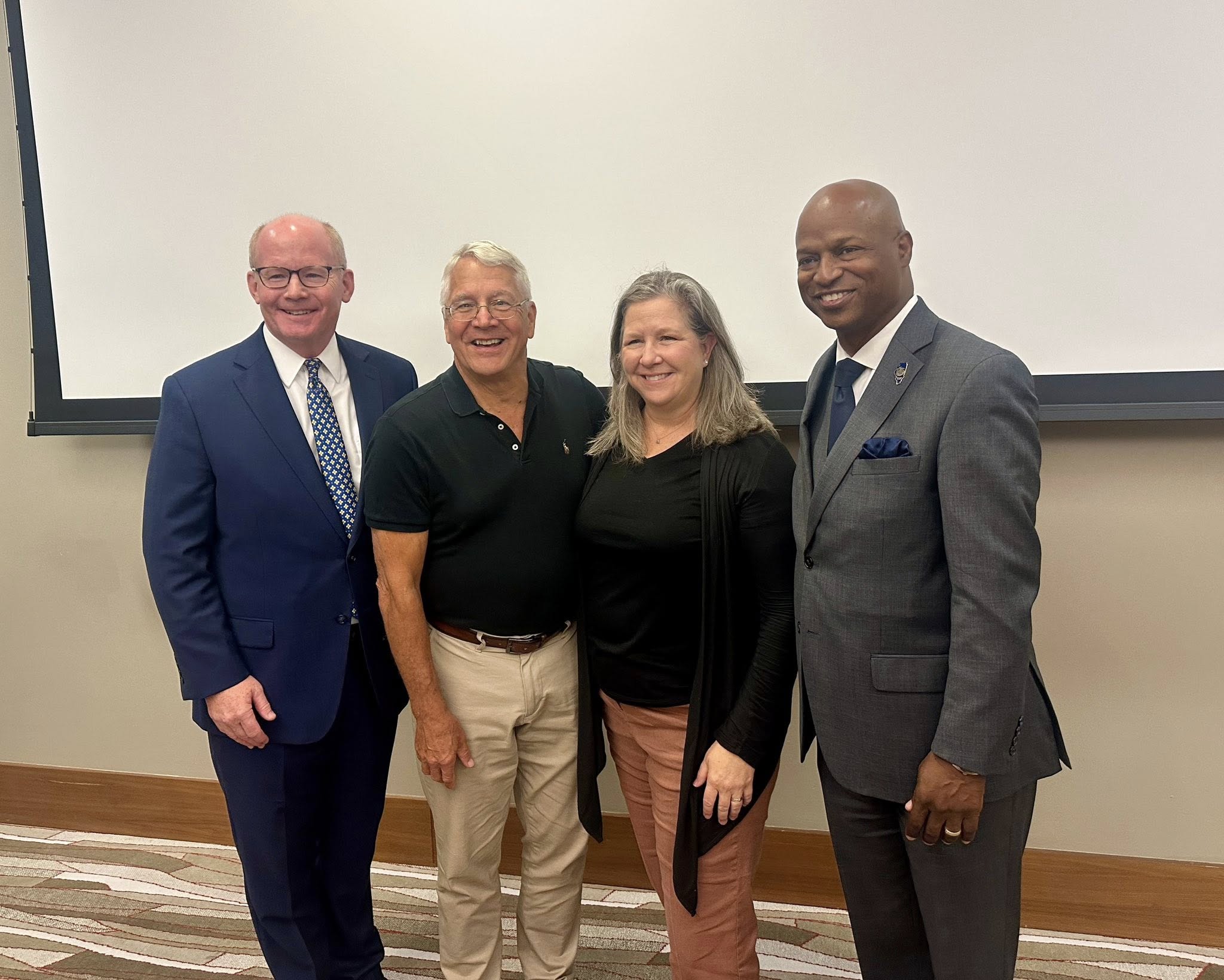
- Details
- Category: Majority Report
Ellman measure to strengthen Illinois gun storage becomes law
SPRINGFIELD – Unsecured weapons in homes have caused devastating and avoidable tragedies in recent years, particularly involving children and teenagers. State Senator Laura Ellman passed a critical public safety law to strengthen gun storage standards in Illinois, ensuring firearms are kept out of the hands of children, vulnerable populations and criminals.
“For far too long, we have witnessed the tragic consequences of unsecured firearms in homes,” said Ellman (D-Naperville). “Firearms, if left unaccounted for and unsecured, pose risks to those who shouldn’t have access to them. Firearm owners can help prevent gun-related incidents by ensuring their guns are securely stored away from others.”
Cunningham bill to track down illegal gun traffickers signed into law
SPRINGFIELD – State Senator Bill Cunningham’s measure to give law enforcement stronger tools to track down the criminals bringing illegal guns into Illinois neighborhoods was signed into law.
“This will give the police the tools they need to track down illegal guns and the criminals that traffic them into our communities,” said Cunningham, a Democrat who represents portions of Chicago and the Southwest Suburbs. “Tracing guns used in crimes and sharing data across jurisdictions will help solve crimes and keep dangerous individuals off our streets.”
Illinois leads nation with student mental health screenings under new Feigenholtz law
CHICAGO – To expand mental health screenings for Illinois’ children and tackle the staggering rise of these challenges in our youth — including increased rates of sadness, hopelessness and difficulty with schoolwork — State Senator Sara Feigenholtz led Senate Bill 1560, a new law that improves access to early detection, diagnosis and treatment among students in grades 3-12.
“This phase of the Children’s Behavioral Health Transformation Initiative is the boldest step to date,” said Feigenholtz (D-Chicago). “Universal mental health screenings in schools help with early identification, and if a child requires services, the BEACON portal is there to assist in accessing comprehensive support and behavioral health services.”
Sound of the State: A conversation on Illinois' historic new commission
In this episode of Sound of the State, State Senator Dave Koehler discusses the Freedom Trails Commission — a statewide effort to map and connect Underground Railroad sites throughout Illinois. Building on the work of the Underground Railroad Task Force, the commission will help communities share their unique histories and preserve the legacy of freedom seekers.

In case you missed it
MEMBERS IN THE NEWS
Senator Mary Edly-Allen, Naperville: New law requires trauma-informed response training for police handling sexual assault cases | WAND
Senator Laura Fine, Glenview: Pritzker signs bill requiring paid break time for nursing mothers | WAND
Senator Julie Morrison, Lake Forest: New Illinois law requires seat belts on school buses | WAND
Copyright 2025 - Illinois Senate Democratic Caucus - All Rights Reserved
- Details
- Category: News
Senate President Don Harmon, Governor JB Pritzker and Speaker of the House Chris Welch published the following op-ed in the Chicago Tribune on Wedneday, July 30, calling on transparency from State Farm on their recent insurance rate hike:
State Farm recently announced it is raising home insurance rates for nearly 1.5 million Illinois homeowners by an average of 27% and with rate hikes peaking as high as 40% for some.
That’s the largest single rate hike in recent history and will add an average of $750 a year to homeowners’ insurance bills.
At a time when the cost of living — particularly housing — is increasingly onerous for families across our state, State Farm’s move requires careful scrutiny and full transparency.
Headquartered in Bloomington, State Farm has long been a valuable Illinois company. It is Illinois’ largest home insurer.
Over the past six years, the Illinois Department of Insurance and the governor’s office have forged a steady partnership and open line of communication with State Farm’s leadership. To be clear, we value the services the company provides, the jobs it sustains and the substantial economic role it plays in our communities.
One in three Illinois homeowners hold policies with State Farm. And since these rate hikes were announced, we’ve heard from many of them. First, there’s the sticker shock of the sheer magnitude of the increase. But beyond that, there’s a deep sense of disappointment in what many feel is a violation of trust between State Farm and its loyal, local customers.
The disconnect stems from what insurance companies call the “catastrophe loss ratio” — the amount an insurer loses from disasters compared with what it collects in premiums.
State Farm’s huge rate hike raises suspicion because it is inconsistent with what we know. When insurance companies suddenly want to increase customer premiums $750 and blame it on their loss ratio, we simply ask them: Prove it.
In such cases, the Department of Insurance typically works with insurers to determine the source of major discrepancies. The department asks insurance companies for ZIP code-level data to make sure homeowners are paying fair insurance rates.
Other insurance companies work with us on this.
State Farm has refused.
State Farm rejected repeated requests for information from the Department of Insurance. Rather than being transparent and letting the numbers speak for themselves, State Farm is withholding vital information not just from the government, but also from its customers.
This lack of transparency takes on added importance when you consider that in 49 of the 50 states, regulators have authority to prohibit rate increases if the market is deemed noncompetitive or the increases are considered “inadequate, excessive or unfairly discriminatory.”
Illinois is the only state where the state government does not have any ability to prevent indiscriminate rate hikes. Special interests in Springfield have lobbied for years to keep it this way.
Momentum was already building for Illinois to change this policy and join the rest of the nation even before State Farm’s rate hike. The company’s actions now have pushed this commonsense consumer protection into the spotlight for the General Assembly’s fall session.
Taken in their totality — State Farm’s sudden, massive rate hike, the lack of transparency and the ongoing lobbying to avoid scrutiny — these events lead us to believe that State Farm may not be basing its rates on the actual data here in Illinois. As states across the country face even more extreme weather than we do, we need to make sure Illinois homeowners are not paying for losses that companies experience in other states.
We sincerely hope this isn’t the case with State Farm. But without the data, homeowners have no assurance. What we ask for is transparency in the interest of protecting homeowners, and the ability to act on the data when companies are unfairly profiting.
We are not asking for special treatment for State Farm, nor do we want the company to operate at a loss. We are seeking accountability and a level playing field.
The people of Illinois deserve nothing less.
- Details
- Category: Majority Report
Collins law helps residents deal with criminal trespassing
SPRINGFIELD – State Senator Lakesia Collins’ new law will give clarity to law enforcement so they can more easily remove criminal trespassers from a person’s home.
“Our intention is to make it easier for law enforcement to enforce criminal trespassing and remove squatters from property,” said Collins (D-Chicago). “We are responding to constituents who have had trouble with squatters who could not be removed without an eviction, and this will simplify the process.”
Halpin and Johnson honor Congressman Evans' memory and legacy with highway dedication
ROCK ISLAND – To honor the life and public service of former Congressman Lane Evans, State Senator Mike Halpin, alongside Representative Gregg Johnson, dedicated I-74 in the Quad Cities to his memory.
“Lane Evans was committed to this community and to this country,” said Halpin (D-Rock Island). “With this dedication, Illinois recognizes Evans’ service and accomplishments. Both as a mentor and a friend, Lane served as a great inspiration to me and showed what public service is all about: speaking your mind and fighting for folks in your community.”
Koehler applauds the new Adient manufacturing facility, bringing jobs and investment to normal
NORMAL – State Senator Dave Koehler commended the announcement that Adient, a global automotive seating supplier, will open a new manufacturing facility in Normal, strengthening Central Illinois’ role in the electric vehicle industry and creating 75 new full-time jobs.
“This announcement is fantastic news for Central Illinois,” said Koehler (D-Peoria). “Adient’s decision to locate in Normal not only builds on our region’s growing role in the EV supply chain, but it also brings new, good-paying jobs to our community.”
Sound of the State: Addressing food insecury on college campuses
In this episode, State Senator Graciela Guzmán discusses her proposal to expand SNAP eligibility for college students and address food insecurity on college campuses in Illinois. Senator Guzmán goes into detail about her personal connection to the cause, and how this legislation could help over 100,000 students access basic nutrition while pursuing their education.

In case you missed it
MEMBERS IN THE NEWS
Senator Laura Ellman, Naperville: Illinois cryptocurrency regulations await Pritzker's approval | WAND
Senator Robert Peters, Chicago: Illinois could strengthen workplace safety standards if federal laws are weakened | WAND
Senator Ram Villivalam, Chicago: Here’s how we can stop Chicagoland transit from falling off the fiscal cliff | StreetsBlog Chicago
Copyright 2025 - Illinois Senate Democratic Caucus - All Rights Reserved

